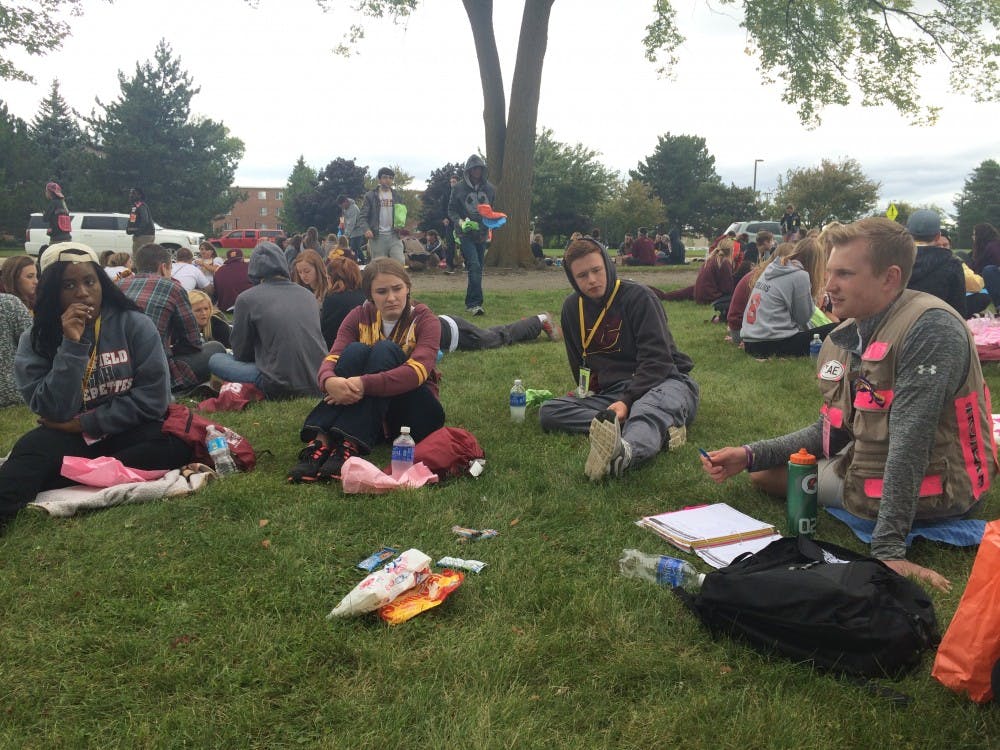Leadership Safari lunch teaches fairness, privilege

Team Camel leader Austin Swiercz (right) explains the purpose of the Fairness Lunch to his Leadership Safari Group.
When Illinois freshman Adaeze Ekowa sat down for lunch with her Leadership Safari group, pink paper bag in hand, she expected a filling lunch and a nice afternoon with her friends. What she didn't expect was crackers.
Unlike others in her group, who were pulling out boxed salads and sandwiches, Ekowa pulled out a lone packet of crackers and a bottle of water. She looked around, wondering if this was all she would be able to eat and why she received less than her peers.
But she wasn't alone in the group. Several others pulled out of their lunch bags only an apple or a bag of nuts. Taking notice of the imbalance of food in the group, it wasn't long before students were offering up bits and pieces of their own meals to make sure no one went without.
"As soon as I got the crackers, people (in my group) were immediately offering me food," Ekowa said. "We came together like a family very naturally."
Leadership Safari director Dani Hiar said the students acted exactly as they were meant to in the confines of the surprise lunch activity.
"Safari is all about providing opportunities to think about things in a way that you have not been accustomed to," she said. "(The Fairness Lunch) serves to give the bigger picture and put things into perspective about the inequality across the world in terms of privilege, food, wealth. That can be done easily through an event like this."
Hiar said the idea of the Fairness Lunch came from a Hunger Theatre conference she attended. At the conference students were broken up according to a caste system and served meals accordingly. Individuals in the higher castes ate catered dinners off of banquet tables while lower caste-mates snacked on the floor without any utensils.
While the Leadership Safari version is far less extreme, the overarching message is still the same. Students are given a random paper bag which contains an unknown amount of food. From there, students can decode to either eat all they were given or share their food so all in the group may have an equal meal.
"We're privileged to be college students and privileged to get an education when there are people across the world who aren't able," Hiar said. "The (Fairness Lunch) reinforces this (idea) in a very tangible way that is not having a discussion, but presenting it to students in their face. For the right group and the right facilitator, the conversation is very deep and very impactful."
Safari Guide Austin Swiercz had one of those "right groups".
Swiercz, who has gone through Leadership Safari before as a participant and now as a guide, commended his participants for sharing among their team.
The experience of attending the Fairness Lunch both as a participant and a guide has taught Swiercz much, he said.
"When I went through as a participant I was angry," he said. "My guide told me sit down and be grateful for what I had and then it really hit me that the way I had been acting was just awful. This year, seeing it as a guide, I understand how much I have grown up and matured in the past four years."
As the lunch drew to a close, Swiercz gathered his group members together, proud of their accomplishments and their ability to empathize with one another.
"The (Fairness Lunch) serves as a way for students to be grateful for what they have because it's a rare occurrence," he said. "At least you're eating three meals a day as many people don't even get one. It's to put it in perspective as to how good we really have it."



